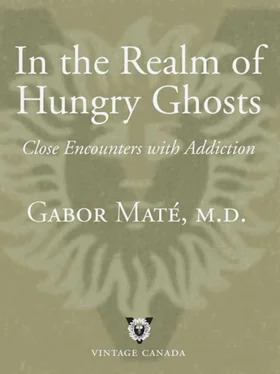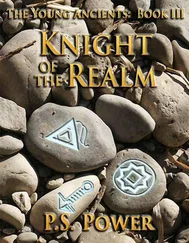Stephen was eleven years old when the town physician drove him out to the countryside, injected him with morphine and then initiated a relationship of drug-enabled sexual exploitation that persisted for many months. At the first hit of morphine the pre-adolescent Stephen was overawed by wonder as his brain flooded with opiates his own circuits could never produce. “What did that feel like?” I ask. “Like a warm, wet blanket,” he replies, “a place of safety—the safety that came before pain and danger, before the enormity of being born, pushed and dragged, kicking and screaming into this world.” The sex trade worker who told me that her first hit of heroin was like a warm, soft hug was fantasizing a state of infant joy. Stephen’s “warm, wet blanket” harkens back even further, to the womb—perhaps the last time he’d had a sense of security.
I had a similar, if much milder, epiphany when in my mid-forties I was prescribed a serotonin-enhancing antidepressant. I was suffused by a sense of well-being I’d never imagined was possible. It’s as if my brain cells were bathed in a normal chemical milieu for the first time. “So this is how human beings are meant to feel,” I remarked to my sister-in-law. You don’t know how depressed you’ve been until you know what it feels like not to be depressed. For both Stephen and me, given the early stresses that influenced our brain physiology, the newly experienced chemical state was a revelation.
How, then, to explain the addictions of people who, like my son Daniel, grew up in relatively comfortable circumstances, with parents who, contrary to being abusive or neglectful, did their best? To answer that question we need to revisit the issue of infancy and childhood, and the unique quality of attunement that optimal brain development requires.
Before we do, however, a few words on the touchy subject of “blaming the parent,” a charge easily levelled at anyone who points to the crucial importance of the early rearing environment. The vigilance around parent blaming arises from people’s natural defensiveness about anything that leaves them feeling accused of not loving their children or not doing their best. It’s also part of a backlash against certain psychoanalytic theories and simplistic forms of pop psychology that flourished from the 1950s to at least the 1980s, which did encourage a blaming and even hostile attitude toward parents, especially mothers.
Yet the point is rarely that parents don’t do their best no matter whom we consider: Stephen Reid’s mother and father, or mine, or my wife and I as parents. As I’ve remarked before, even for my addicted patients, their greatest shame and regret is their failure to parent their own children, a sorrow that rarely fails to bring tears to their eyes. The point is that, as in the parenting my children received, our best is circumscribed by our own issues and limitations. In most cases, those issues and limitations originated in our childhoods—and so on down the generations. That parenting styles are passed on from one generation to the next is known both from human studies and animal experiments. In the latter, it has been shown that parental nurturing practices can be biologically inherited, not through genes but through molecular mechanisms. In other words, the parenting an infant receives can “program” her own brain circuitry in ways that will influence and may even determine how she will parent. The neurological basis of such transmission probably involves the oxytocin “love hormone” system, which is key in the mother-infant attachment relationship. 3If we understand these facts, it’s obvious that there is no one left to blame. I’ve remarked before that a blaming attitude is an entirely useless commodity. As the Sufi poet Hafiz writes, blame only perpetuates the “sad game.”
I had an almost bizarre taste of the charge of parent bashing after the publication of Scattered Minds, my book on attention deficit disorder. In explaining my own ADD—a prime risk factor for addictions—I referred to the history of my infancy. “My mother and I had little opportunity for normal mother-infant experiences,” I wrote. “These were hardly possible, given the terrible circumstances, her numbed mind state, and her having to concentrate her energies on basic survival. Attunement,” I asserted, “can be severely interfered with despite the deepest feelings of love a mother may have.”
The first review of Scattered Minds appeared in the Toronto Star. “Maté blames his mother,” it said.
Blame, like beauty, is in the eye of the beholder.

Brain development can be affected adversely not only by “bad stimulation” coming in, to quote Dr. Robert Post but also by insufficient “good stimulation” occurring—by “nothing happening when something might profitably have happened,” in the wonderful phrasing of the great British child psychiatrist D.W. Winnicott. Stressed parents have difficulty offering their children a specific quality required for the development of the brain’s self-regulation circuits: the quality of attunement. Attunement is, literally, being “in tune” with someone else’s emotional states. It’s not a question of parental love but of the parent’s ability to be present emotionally in such a way that the infant or child feels understood, accepted and mirrored. Attunement is the real language of love, the conduit by which a pre-verbal child can realize that she is loved.
Attunement is a subtle process. It is deeply instinctive and is easily subverted when the parent is stressed, depressed or distracted. A parent can be fully attached to the infant—fully “in love”—but not attuned. For example, the infants of depressed parents experience physiological stress not because they are not loved, but because their parents are not attuned with them—and attunement is especially likely to be lacking if parents missed out on it in their own childhoods. Children in poorly attuned relationships may feel loved, or be aware that love is there, but on a deeper and essential level they do not experience themselves as seen or appreciated for who they really are. Daniel, ever sensitive that something was lacking even if he couldn’t exactly identify what, once wrote me a description of how he experienced his childhood:
It seemed to me that I was growing up in a house where love was never in question; it was often affirmed. So I knew I was loved, but it came in shifting, confusing and unpredictable ways that left me on my guard about it, and always craving it in a simpler, more straightforward form. I felt I had to be crafty to catch it and get some for myself, to pin it down.
My son’s recollection doesn’t surprise me. My workaholism and other addictive behaviours left me only inconsistently present for my children, and the stresses in our marriage often meant that my wife and I were both preoccupied. It makes sense that Daniel would have felt he had to work for attention, that the love offered him was conditional and that his emotional terrain was often not appreciated, shared or mirrored by his parents.
Poorly attuned relationships provide an inadequate template for the development of a child’s neurological and psychological self-regulation systems. In the words of child psychiatrist Daniel Siegel:
From early infancy, it appears that our ability to regulate emotional states depends upon the experience of feeling that a significant person in our life is simultaneously experiencing a similar state of mind. 4
Self-regulation does not refer to “good behaviour” but to the capacity of an individual to maintain a reasonably even internal emotional environment. A person with good self-regulation will not experience rapidly shifting extremes of emotional highs and lows in the face of life’s challenges, difficulties, disappointments and satisfactions. She does not depend on other people’s responses or external activities or substances in order to feel okay. The person with poor self-regulation is more likely to look outside herself for emotional soothing, which is why the lack of attunement in infancy increases addiction risk. It’s what Stephen Reid meant when he said, “I’ve spent too much time on external things, bouncing off other people.”
Читать дальше













